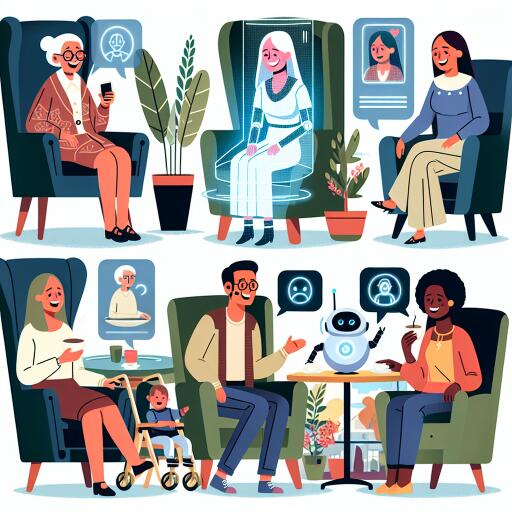Exploring the Role of AI in Alleviating Loneliness
As societies across the globe grapple with an escalating loneliness epidemic, artificial intelligence (AI) emerges as a beacon of hope. According to cognitive robotics expert Professor Tony Prescott of the University of Sheffield, AI technology bears the potential to offer much-needed companionship to those feeling isolated.
In his enlightening work, The Psychology of Artificial Intelligence, Professor Prescott discusses how AI could play a crucial role in facilitating social interaction for the lonely. With loneliness adversely affecting human health, the advancements in AI technology might be the key to mitigating this modern-day malaise.
The Devastating Impact of Loneliness
Recent studies paint a grim picture of loneliness as a significant health hazard, more detrimental than obesity. It’s linked with a 26% increase in the risk of premature death and correlates with serious conditions such as cardiovascular disease, dementia, stroke, depression, and anxiety. A staggering 3.8 million people in the UK suffer from chronic loneliness, and a Harvard study highlights that in the US, 36% of adults, surging to 61% among young adults, report experiencing severe loneliness.
Professor Prescott points out the vicious cycle of loneliness, where social isolation leads to diminished self-esteem, discouraging further interaction and deepening the sense of loneliness. AI companionship, he argues, could offer a way to break this cycle. By providing a form of reciprocal social interaction, AI companions can bolster feelings of self-worth and help maintain or enhance social skills.
AI as a Companion: Opportunities and Risks
While the notion of forming companionships with AI may seem futuristic, Prescott suggests it holds the potential to address the loneliness epidemic head-on. By engaging with AI companions, individuals can experience a form of social interaction that is both stimulating and personalized, potentially scaffolding feelings of self-worth and aiding in the improvement of social skills.
However, Professor Prescott does not shy away from discussing the potential risks associated with AI companionship. He raises concerns about AI systems being designed to maximize user engagement, sometimes at the expense of the user’s well-being, and calls for regulatory measures to ensure that these systems are developed responsibly.
The Broader Context: AI and Human Cognition
A celebrated figure in the fields of robotics and AI, Prescott brings a unique perspective by melding his expertise with insights from psychology and philosophy. In The Psychology of Artificial Intelligence, he navigates the intricate relationship between the human brain and artificial intelligence, examining the possible futures of this symbiosis.
The book delves into pressing questions such as the similarity between computers and brains, the potential for AI to surpass human intelligence, and the creative capacities of AI. Prescott explores the intriguing possibility of AI assisting with global challenges like climate change and even extending human intelligence through collaboration.
As the partnership between psychology and AI strengthens, Prescott believes it will unlock deeper understandings of both natural and artificial cognition. This synergy promises to shed light on fundamental questions about human identity and coexistence with AI, setting the stage for a future where artificial and human intelligences collaborate to address some of society’s most pressing challenges.
The Psychology of Artificial Intelligence, published by the Taylor & Francis Group, not only provides a comprehensive exploration of AI’s potential impact on society but also ignites a conversation on the future of human-AI relationships. As we stand on the brink of a new era in technology, it offers a hopeful outlook for those feeling the sting of loneliness, suggesting a future where AI companionship could very well become a staple of human social interaction.










